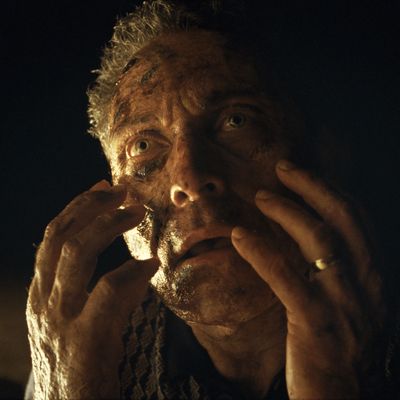
Warning: Spoilers ahead.
From the moment The Sixth Sense blew audiences’ minds with a shocking conclusion so well conceived it helped mainstream the phrase “no spoilers, please” — M. Night Shyamalan’s name has been synonymous with the twist ending. Old, his latest film, recalls the strengths the auteur first displayed on The Sixth Sense: An advanced ability to hook viewers with a mystifying premise plus the capacity to explore big themes like mortality and regret in the space of a fright. Old also exemplifies the faults in the director’s later efforts: a penchant for problematic portrayals of mental health and rudderless camerawork in service of a surprise that doesn’t feel earned.
Old begins simply: An apparently perfect family composed of mother Prisca (Vicky Krieps), father Guy (Gael García Bernal), their 6-year old son Trent (Nolan River), and their 11-year old daughter Maddox (Alexa Swinton), travel to a paradisal island for a restive vacation. The island seems perfect: The hotel staff throws a welcome party, complimentary cocktails are offered, and the calendar is stuffed with events like parasailing, dance classes, etc. Trent even makes quick friends with a lonely local boy Idlib (Kailen Jude), who possesses valuable secrets concerning the island.
The affable resort manager tells the family of a private picturesque beach to visit. Upon arriving at the seaside oasis, however, not only do the family’s underlying pains spring to the surface, the sandy supernatural landscape seems to cause them to age rapidly. (Two years every hour, to be exact.) Trapped on the beach with two other families, surrounded by natural barriers, the imprisoned vacationers engage in a fight for survival against the elements and one another. In the horrors of Old is an imperative message: Savor life’s every minute.
If only the film’s ending lived up to that lofty mandate. Instead, the slow burn of a journey the characters take is more enlightening than the eventual twist. Along the way, we discover that Prisca, diagnosed with a benign tumor, cheated on Guy and the couple are nearing a divorce; within earshot of their children, each accuse the other of blowing up the marriage. But on the beach they do grow closer again, leaning on each other as Guy goes blind and Prisca grows deaf. By their death of old age, which they reach in a span of a day by the seaside, they barely remember what they were fighting about, deciding that it wasn’t so important in the context of their lifelong love.
A violent, schizophrenic cardiothoracic surgeon named Charles is also confined to the beach — providing a distasteful albeit common trope of a character who appears in even Shyamalan’s finest films. But Charles isn’t the most intriguing member of his family. Rather his vain, bombshell wife Chrystal (Abbey Lee) is the one to watch, the physical wear and tear of aging propelling her to a vicious mental breakdown, devolving to a kind of monstrous cave dweller. Is the horror filmmaker making a grand statement about ephemeral beauty standards? If so, then why does Chrystal become the movie’s single victim of blatant body horror, Suspiria style? (In another, more emotionally horrifying scene, a pregnant woman gives birth to a baby who, because of the time-warping nonsense of the beach, dies with a minute of being alive on the beach.)
Shyamalan undercuts many of his most fascinating plotlines in several mind-numbing missteps, namely by neatly sweeping away any lingering questions from the audience. It’s revealed that, yes, other families have died on this beach — they are why rusted silverware, clothes, and notebooks could be found buried in the sands. One found journal, replete with hand-sketched pictures, plainly explains why they’re unable to escape: The surrounding rocks are magnetized, somehow causing black-out headaches to anyone who dares to traverse them. (Between Old and F9, magnets are becoming an essential 2021 plot device. At least with Old, there are no hints that we’re getting some larger, Shyamalan cinematic universe.)
But it’s Trent’s sneaking suspicion that the vacationers are being watched from a hillside that left me groaning into the ether. We learn that the driver who first took them to the beach — played by Shyamalan himself — has been spying on them the whole time. He works for a band of scientists who have been using the beach to try out various pharmaceutical drugs on sick, at-risk humans in an accelerated environment. (Each family, it turns out, included a member with a preexisting health condition. The test subjects’ rapid aging allowed the pharmaceutical companies to discover the “lifelong” effects of a drug in no time at all.) The families on the beach were merely guinea pigs.
The now adult Trent and Maddox, the only two survivors by the movie’s end, eventually escape from the beach thanks to a clue from Idlib, who tells them to swim through the (non-magnetized?) coral reefs. They arrive on the mainland to expose the nefarious scientist to the world, but nothing in their final scene, of Trent and Maddox helicoptering home to their aunt, is as emotionally satisfying as their time on the beach. (Why do these two adults need to be entrusted to their aunt? How, exactly, did they blow the whistle on the pharma baddies?) By inserting himself into the narrative, a common technique for Shyamalan, is the director poking fun at his reputation for caring more for puzzles than characters? I don’t think he entirely knows. He has the premise but not the experiential grounding to stick a philosophical landing.

